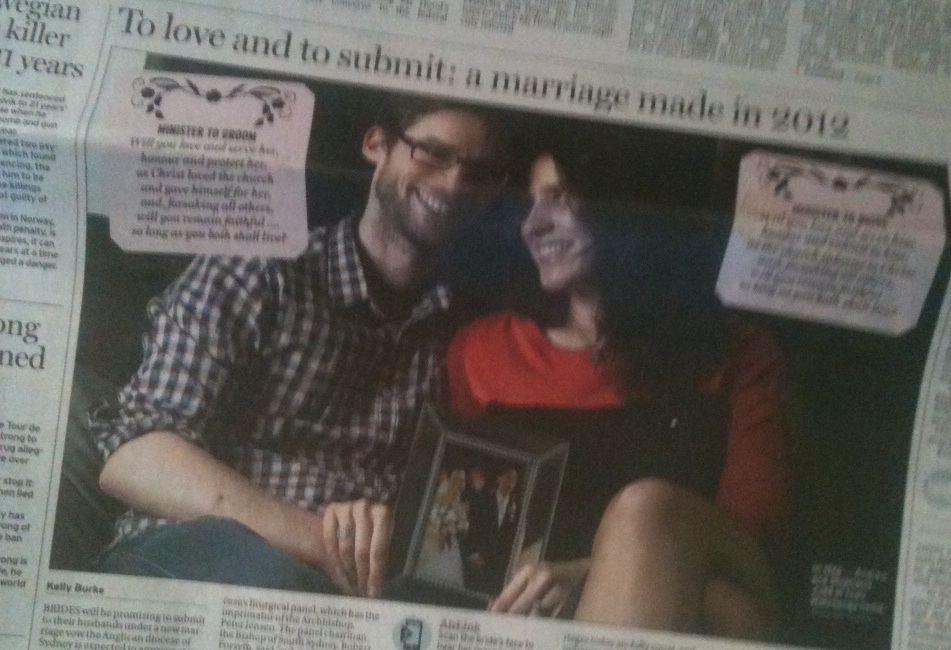The news that the Sydney Morning Herald is engaged in one of their regular stoushes with the Anglicans in Sydney is some of the best news that I (in my capacity as a Fairfax shareholder) have had for a long time. Wearing my Christian hat, maybe it’s not so good news.
Because a good Anglican story has been a good circulation-booster in the harbour city for as long as I can remember. The SMH has a peculiar circulation pattern that captures some of the more densely Anglican suburbs quite efficiently. Outraged loyalists, and those that do not like the evangelical churches that make up the Anglicans of Sydney, can be relied upon to write record numbers of letter to the editor and to buy the paper the next day – or go online – to see if they are in it.
When I worked on the paper I once calculated that ten per cent of its readership were church-going Anglicans. It has been a strange love-hate relationship between pew-sitter and paper that does not appear to be replicated in any other Australian city.
The latest stoush started with a story by Kelly Burke on new marriage vows, that include the word “submit” for the bride, provided a good pic story for Page One. The still-best-selling Saturday edition, too. A final year student at Moore College, Andrew Judd and his wife Stephanie, provided an appealing account of why promising to submit to Andrew was no problem for Stephanie.
Facebook and blogs make it clear that Sydney Anglicans were unhappy that the critics Dr Kevin Giles and Muriel Porter were dragged out and given a part in Andrew and Stephanie Judd’s story. The video version of the story focused exclusively on Andrew and Stephanie’s decision to incorporate ‘submit’ into their vows.

Andrew and Stephanie Judd on the front page of the Sydney Morning Herald on Saturday in the article that sparked the latest Sydney Anglican v SMH stoush.
Religion is one area where the media privileges dissidents. It’s the Bishop John Shelby Spong effect. The rebel – and Spong was the rebel bishop par excellence -always gets a Guernsey. That way the reporter can say “I have done my job. Look I have included the Other Side”. The better the story is for the Christians or a particular church—and Andrew and Stephanie made good copy—the more pressure there is to report “the Other Side”.
This often means that stories about Christianity are reported as conflict stories. If the measure is “Will this attract people to church?”, the answer is usually “no”. Circulation boosting yes; church attendance boosting, probably not.
Come Monday morning and there was a follow up. Julia Baird, a long time Anglican dissident in Sydney had dug up a paper given at a Moore College seminar.
In her paper Caroline Spencer, a young Minister, addressed the issue of whether the conservative “Complementarian” view of men and women relationships extends into the workplace. In Complementarian circles it is controversial.
As it happens I was at the seminar, organised by Moore College’s Priscilla and Aquila Centre, where this paper was presented. It took a full day before I recognised it, because it was not presented as definitively or as stridently as Julia Baird reported.
(To be fair it is difficult to pick “tone” from notes of a presentation.)
It was made clear at the seminar this was not an official Moore College or Sydney Anglican viewpoint, but as one person’s opinion.
And from memory, Caroline Spencer presented it as a series of ideas she was attracted to, but had not reached a final view on.
It was an exercise in Academic freedom, as college Principal John Woodhouse pointed out on the day, and certainly received a lot of critical comment in a question time that followed.
My impression on the day, particularly from staff comments was that the audience at Moore College that day was intrigued and stimulated by the discussion, but was not convinced that Caroline Spencer was right.
It is extremely unlikely that this sort of discussion paper would ever make the media, if it was given at any other Bible College or Theological Seminary. But Sydney is not the same as other cities, its Anglicans are distinctly different, and so is its daily paper.
There’s been some pretty good letters to the editor published in today’s SMH. But I would score it as a small win for circulation; not so great for church attendance.
Email This Story
Why not send this to a friend?


